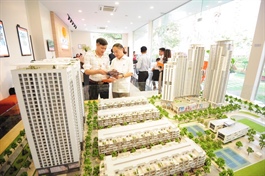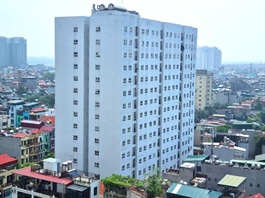Retailers jostle for superiority
Retailers jostle for superiority
The boom of e-commerce in the rental market space in commercial centres has forced developers to assert their distinct identities.

Business strategies including brand and tenant positioning and product diversification are being evaluated as critical success factors for shopping mall developers. The three biggest commercial space developers in Vietnam – Vincom, Lotte, and AEON – are all following this path.
According to the latest data published by Vingroup’s Vincom Retail Company, the group currently owns 81 shopping centres, with two new Vincom Plaza shopping centres expected to open this year.
Pham Thi Thu Hien, deputy CEO of Sales and Marketing for Vincom Retail, said, “In 2021, despite the difficulties posed by the pandemic, Vincom Retail still had many tenants around the world and they have high expectations for the Vietnamese market. Large companies have asked us to formulate a long-term development plan but domestic tenants have said that they are confident in the lease plan for the next 1-3 years.”
Vincom Retail will focus on research and development for next-generation products to catch up with global trends. The new Vincom Mega Mall model is expected to be launched, aiming to become the first “Life-Design Mall” to provide a modern lifestyle creation destination.
To develop its tenant system, Vincom Retail focuses on expanding its network into three groups including large international fashion brands, services and food and beverage tenants, and a group of Vietnamese companies with the potential to develop into chain stores. For the projects that have already been put into operation, Vincom Retail continues to upgrade its planning to meet the latest trends and needs of the market.
Entering Vietnam in 2018, Lotte Mart only owns 14 commercial centres in various localities. With a strategy of developing commercial centres based on real estate and offices for rent, Lotte Mart’s model is still an auxiliary sub-project to increase attractiveness of the main real estate product. However, the scale of Lotte’s shopping centres has grown slowly. Compared to the target announced in 2015 of owning 60 shopping centres by 2020, it seems the South Korean brand will need more time to expand. The group also had to close a shopping centre in Hanoi last July due to a change in development strategy.
The appearance of more domestic and foreign commercial centre developers such as Takashimaya, Saigon Center, Syrena, Lotte, AEON, and BRG Group has proven that Vietnam is an attractive market for commercial space leasing. Many large domestic and foreign retailers are also looking to expand the market and increase their scale in the nation.
Although affected by the pandemic, the sector has shown signs of rapid recovery since the beginning of this year. According to Savills Vietnam, the average occupancy rate in Ho Chi Minh City in the first quarter reached 92 per cent and the average asking price increased by 3 per cent on-quarter. Developers have increased the minimum rental period and applied an annual rate increase policy of up to 10 per cent.
The increasing appearance of large-scale shopping centres has had a significant impact on the shopping habits and service culture of Vietnamese consumers. Director of the Commercial Leasing Division at Savills Hanoi Hoang Nguyet Minh said, “In markets such as Bangkok, Singapore, and Hong Kong, visitors to shopping malls mainly focus on shopping, but in Vietnam, people are looking to shopping malls more for the purpose of eating and entertainment.”
The challenge for shopping mall developers is not only to diversify their services but also to put service quality and customer values as the focus of competition.
Despite having a lot of potential, not all shopping mall developers are successful in the Vietnamese market and many giants in the retail sector, such as Auchan and Parkson, have had to receive bitter lessons. However, there are also units that still develop sustainably in the market and increase their influence, of which AEON Mall is a clear example.
Currently, AEON Mall is one of the only foreign trade centre investors that does not associate shopping mall projects with real estate ventures and it does not currently have any real estate activities in Vietnam. Although its model includes a variety of services including fashion, cosmetics, restaurants, cinemas, banks, and fitness centres like other shopping malls, they are based on a unified front, which makes a difference in its customer service standards.
An AEON Mall Vietnam representative said, “Besides our efforts to develop a sustainable shopping centre with sound environmental, social, and governance targets, we will also try to design a real interaction space for customers.”
AEON Mall plans to promote projects in other localities around Vietnam outside of Hanoi and Ho Chi Minh City. The Japanese retail giant is set to have 25 shopping malls across the country by 2025, building on its current network of six that have been put into operation since 2014.




















